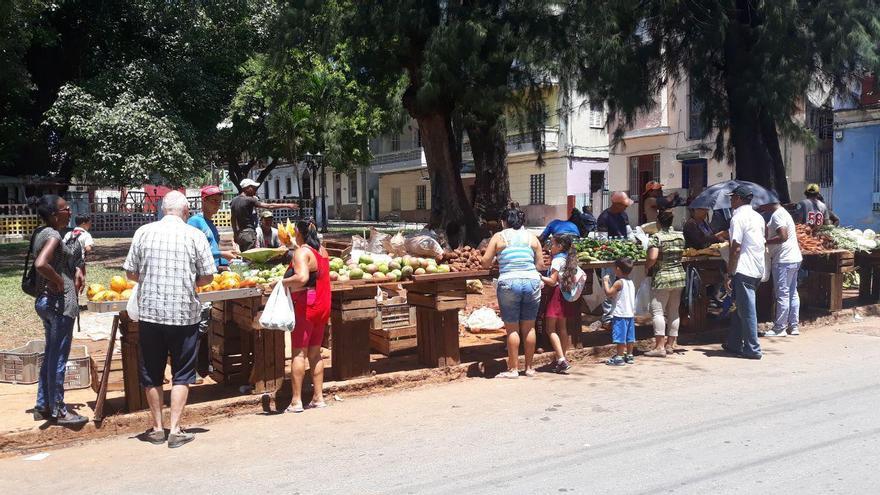
![]() 14ymedio, Havana, 9 July 2019 — Concerned about the risk of inflation after the salary increase decreed by the Government two weeks ago, on Monday the Ministry of Finance and Prices published a list of prices, in convertible pesos (CUC) and in national currency (CUP), for products that are sold in the network of state stores and agricultural markets.
14ymedio, Havana, 9 July 2019 — Concerned about the risk of inflation after the salary increase decreed by the Government two weeks ago, on Monday the Ministry of Finance and Prices published a list of prices, in convertible pesos (CUC) and in national currency (CUP), for products that are sold in the network of state stores and agricultural markets.
A Price Observatory will be created to evaluate, at the municipal level, the “trends and behaviors” of the internal market. The inventory of products, barely twelve pages, includes food but also some appliances, such as televisions and coffee makers, as well as two types of cement and cigarettes.
The agency will rely on “the participation of specialists from various administrative entities” and, according to the official press, may sanction state or private establishments that violate the regulated price lists.
The president of the Parliament, Esteban Lazo Hernández, spoke of “the battle” against those who try to raise prices for goods and services. “It is won with the people, with control and denunciations,” he said, warning of possible irregularities by administrators or employees. A call for customers themselves to report price cap violations have been frequent in the last year, with the increase in the prices of the basic products, cleaning supplies and private passenger transport.
In a country where the minimum monthly salary does not exceed 16 CUC (Cuban convertible pesos, roughly $16 US), the Ministry of Finance and Prices decrees that the cheapest coffee package sold in state stores costs about 0.85 CUC and the most expensive — always produced domestically — costs 14.45 CUC.
In those same premises, a 20-liter bottle of oil, another product that has been scarce this year, has a price of 38.40 CUC while a kilogram of spaghetti is 1.65 CUC and a 22 kg box of chicken thighs is 37.40 CUC.
The Ministry also disclosed a list of maximum prices in national currency for products marketed in state-managed agricultural markets. A pound of black beans is set at 10 Cuban pesos (roughly 40¢ US) and fruits and vegetables will have prices regulated by season.
The president of the National Assembly alluded in his words to privately managed agricultural markets and regretted that in some of these establishments “in the capital a pound of pork these days is priced at 70 Cuban pesos with lemons at 35.” Lazo explained that “as a result immediate and vigorous action by the corresponding authorities these prices were lowered to 45 and 15, respectively.”
The president of the Assembly of People’s Power in Havana, Reynaldo García Zapata, said that prices had fallen because of the “actions of the authorities.” However, this week meat prices remained the same in the markets in the capital.
Díaz-Canel and his cabinet have devoted ample space on state television to ensure that the dreaded price increase will not happen. On a recent Roundtable TV show, the Cuban leader defended himself against those who criticized the wage increase and denied that it was a populist measure at a time of crisis.
Economy Minister Alejandro Gil Fernandez said that “the rules of the game remain the same and from the point of view of the cost of production everything will continue as before.” Gil Fernandez dismissed that the prices are rising because according to him the law of supply and demand “does not apply” to the Cuban economy.
Since the end of 2016, the imposition of price caps began on the island, initially in the province of Artemisa, reaching all the municipalities of Havana, Cienfuegos, Villa Clara and other regions of the country. Most consumers have celebrated the lower prices but regret the drop in quality and supply.
The prices have also led to the diversion of agricultural products to the black market, an increasingly common practice on the roads of the island, where unlicensed merchants offer products hard to find in markets, such as onions, garlic, beans and pork.
___________________
The 14ymedio team is committed to serious journalism that reflects the reality of deep Cuba. Thank you for joining us on this long road. We invite you to continue supporting us, but this time by becoming a member of 14ymedio. Together we can continue to transform journalism in Cuba.
